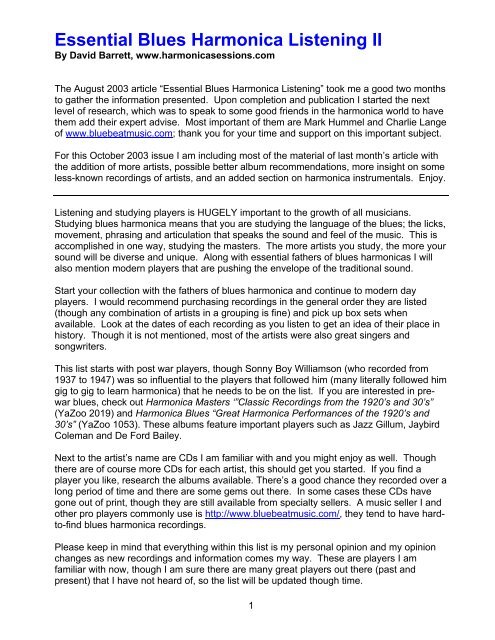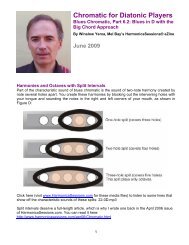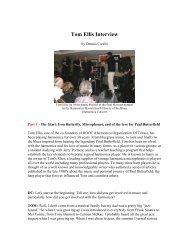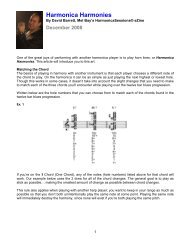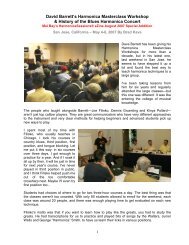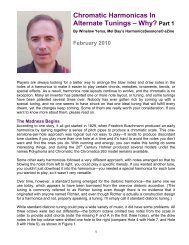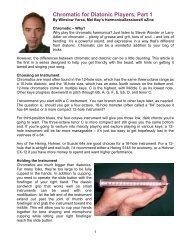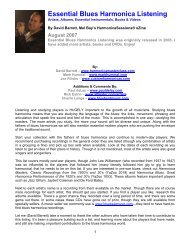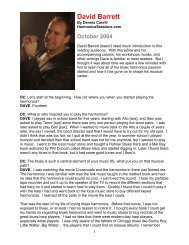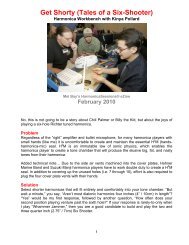Essential Blues Harmonica Listening II - Mel Bay's Harmonica ...
Essential Blues Harmonica Listening II - Mel Bay's Harmonica ...
Essential Blues Harmonica Listening II - Mel Bay's Harmonica ...
You also want an ePaper? Increase the reach of your titles
YUMPU automatically turns print PDFs into web optimized ePapers that Google loves.
<strong>Essential</strong> <strong>Blues</strong> <strong>Harmonica</strong> <strong>Listening</strong> <strong>II</strong><br />
By David Barrett, www.harmonicasessions.com<br />
The August 2003 article “<strong>Essential</strong> <strong>Blues</strong> <strong>Harmonica</strong> <strong>Listening</strong>” took me a good two months<br />
to gather the information presented. Upon completion and publication I started the next<br />
level of research, which was to speak to some good friends in the harmonica world to have<br />
them add their expert advise. Most important of them are Mark Hummel and Charlie Lange<br />
of www.bluebeatmusic.com; thank you for your time and support on this important subject.<br />
For this October 2003 issue I am including most of the material of last month’s article with<br />
the addition of more artists, possible better album recommendations, more insight on some<br />
less-known recordings of artists, and an added section on harmonica instrumentals. Enjoy.<br />
<strong>Listening</strong> and studying players is HUGELY important to the growth of all musicians.<br />
Studying blues harmonica means that you are studying the language of the blues; the licks,<br />
movement, phrasing and articulation that speaks the sound and feel of the music. This is<br />
accomplished in one way, studying the masters. The more artists you study, the more your<br />
sound will be diverse and unique. Along with essential fathers of blues harmonicas I will<br />
also mention modern players that are pushing the envelope of the traditional sound.<br />
Start your collection with the fathers of blues harmonica and continue to modern day<br />
players. I would recommend purchasing recordings in the general order they are listed<br />
(though any combination of artists in a grouping is fine) and pick up box sets when<br />
available. Look at the dates of each recording as you listen to get an idea of their place in<br />
history. Though it is not mentioned, most of the artists were also great singers and<br />
songwriters.<br />
This list starts with post war players, though Sonny Boy Williamson (who recorded from<br />
1937 to 1947) was so influential to the players that followed him (many literally followed him<br />
gig to gig to learn harmonica) that he needs to be on the list. If you are interested in prewar<br />
blues, check out <strong>Harmonica</strong> Masters ‘”Classic Recordings from the 1920’s and 30’s”<br />
(YaZoo 2019) and <strong>Harmonica</strong> <strong>Blues</strong> “Great <strong>Harmonica</strong> Performances of the 1920’s and<br />
30’s” (YaZoo 1053). These albums feature important players such as Jazz Gillum, Jaybird<br />
Coleman and De Ford Bailey.<br />
Next to the artist’s name are CDs I am familiar with and you might enjoy as well. Though<br />
there are of course more CDs for each artist, this should get you started. If you find a<br />
player you like, research the albums available. There’s a good chance they recorded over a<br />
long period of time and there are some gems out there. In some cases these CDs have<br />
gone out of print, though they are still available from specialty sellers. A music seller I and<br />
other pro players commonly use is http://www.bluebeatmusic.com/, they tend to have hardto-find<br />
blues harmonica recordings.<br />
Please keep in mind that everything within this list is my personal opinion and my opinion<br />
changes as new recordings and information comes my way. These are players I am<br />
familiar with now, though I am sure there are many great players out there (past and<br />
present) that I have not heard of, so the list will be updated though time.<br />
1
Grandfather of <strong>Blues</strong> <strong>Harmonica</strong><br />
• Sonny Boy Williamson I (John Lee Williamson) – Played acoustic harmonic and really<br />
defined the style for all players after him. Document Records has a complete recorded<br />
works series (DOCD-5055 through DOCD-5059)<br />
Fathers of <strong>Blues</strong> <strong>Harmonica</strong> – All these players where pioneers and true masters of the<br />
instrument.<br />
• Big Walter Horton – Though rough around the edges at times, Big Walter played a very<br />
powerful harp (acoustic and amplified). He backed players (Muddy Waters and Jimmy<br />
Rogers to name two) often in Chicago. He recorded and performed for many years<br />
playing a variety of styles within the blues from classic full band vocal tunes,<br />
instrumentals, and mesmerizing harp only tunes. Album: Can’t Keep Lovin’ You (Blind<br />
Pig BP71484) or Fine Cuts (Blind Pig BP 70678). Some of my favorite Horton is when<br />
he backed Robert Nighthawk, Johnny Shines on ‘Evenin’ Shuffle (JOB 1952-53) and<br />
Johnny Young. For a complete listing of Big Walter Horton recordings visit Joe’s<br />
Filisko’s website at www.customharmonicas.com for a downloadable PDF. A great<br />
resource.<br />
• Little Walter – The innovator of amplified harmonica (some call him the king of the blues<br />
harmonica). Early recordings have him playing with Muddy Waters acoustic with his<br />
own material coming soon after both acoustic and amplified. The amplified work really<br />
set him apart. His 1953 recording Juke placed him on the music charts and changed<br />
the blues harmonica sound forever. Along with vocal tunes, he recorded many<br />
instrumental tunes (Juke, Off the Wall, Roller Coaster, Boogie, Rocker, etc.) that stand<br />
to this day as some of the best amplified playing ever. His phrasing is especially a<br />
focus of study for students wanting to play instrumentals. Album: The <strong>Essential</strong> Little<br />
Walter (Chess/MCA CHD2-9342 - 2 CD set) & Confessin’ The <strong>Blues</strong> (Chess MCD<br />
09366). Some other nice work is when Walter backed John Brim (Chess).<br />
• Sonny Boy Williamson <strong>II</strong> (Rice Miller) – Not to be confused with the original John Lee<br />
“Sonny Boy” Williamson, Rice Miller was also a harmonica powerhouse. Miller played<br />
acoustic harp and rarely did instrumentals. Album: The <strong>Essential</strong> Sonny Boy<br />
Williamson (Chess/MCA CHD2-9343 - 2 CD set). Also check out his earlier Trumpet<br />
recordings and work backing Baby Boy Warren on Excello.<br />
More Classic Players all of these players can be considered fathers of blues harmonica as<br />
well, though they came after the above artists or were not as prolific in the playing skills.<br />
• James Cotton – Known as Mr. Super Harp his playing is very strong with a performance<br />
career spanning almost 50 years. His best-known harmonica tune is Creeper, which is<br />
still performed regularly today as a showstopper. Album: Best of the Verve Years<br />
(Verve D108381).<br />
• Jimmy Reed – Known as the master of the 1 st Position high end. He didn’t have any<br />
more technique skill than other players of that time on high-end 1 st Position playing, but<br />
he did it a lot of it. His phrasing is sparse and very melodic. A great study for his 1 st<br />
Position and 2 nd Position work. Album: The Very Best of Jimmy Reed (Rhino R2 79802)<br />
• George <strong>Harmonica</strong> Smith – Player who moved to California and directly influenced the<br />
playing of Rod Piazza, William Clarke, and many others. Though his diatonic<br />
harmonica work was fantastic he’s most known for his chromatic work giving him the<br />
name “King of the <strong>Blues</strong> Chromatic”. His song <strong>Blues</strong> in the Dark is a benchmark for all<br />
chromatic players to play. Album: Little George Smith, <strong>Harmonica</strong> Ace, The Modern<br />
Masters Collection (Ace CDCHD 337)<br />
2
• Junior Wells – Another heavy hitter of blues harmonica, Wells really came into his own<br />
in the mid 60’s where his funky harmonica style really jumps out. Messin’ with the Kid<br />
(Chicago The <strong>Blues</strong> Today, Vol. 1, Vanguard #9213, 1966) is regarded as a great<br />
harmonica piece. Album: Junior Wells Hoodoo Man <strong>Blues</strong> (Delmark DD-612). It’s My<br />
Life Baby on Vanguard is recorded live and is a masterpiece of blues performance.<br />
• Howlin’ Wolf – Though basic in approach, his presentation was bold with a strong<br />
vibrato. Album: His Best (Chess Anniversary Collection)<br />
• Louis Myers – <strong>Harmonica</strong> player commonly overlooked due to backing Little Walter in<br />
the Aces band on guitar. Surprisingly good harmonica. Album: Harp & Soul (Fuel<br />
2000) and other collections mentioned in the compilation section.<br />
More Classic Players players that you might not of heard of, but should take a listen to.<br />
• Slim Harpo – Very musical player (good phrasing) who recorded for many years. Best<br />
know song is Baby Scratch My Back. Album: The Best Of (Excello)<br />
• Lazy Lester – Very tasty playing. Album: I Hear You Knockin'!!! (Excello)<br />
• Jerry McCain – Jerry recorded very early in his career and stopped music for many<br />
years to come back to it late on life. His most well known recording is Steady. Album:<br />
That's What They Want: The Best of Jerry McCain (Excello) or <strong>Blues</strong> Masters The<br />
<strong>Essential</strong> Collection, V4 <strong>Harmonica</strong> Classics (Rhino R2 71124)<br />
• Junior Parker – Parker started off as a harmonica player with vocals soon taking over<br />
the spotlight. Though not known as a harmonica player’s harmonica player everything<br />
he played was very tasty. Album: Junior’s <strong>Blues</strong>/The Duke Recordings V1 (MCA MCAD<br />
10669)<br />
• Dr. Ross – Great one-man-band with good harp. Album: Boogie Disease (Arhoolie CD<br />
371)<br />
Obscure Classic Players players that I’d be surprised you’ve heard of!<br />
• Buster Brown – Best known for “Fannie Mae”, but also played quite a bit of harp.<br />
Album: Raise A Ruckus Tonight (Relic 7064)<br />
• Little Mac – Not a bad harp player with some good songs. Album: Chicago <strong>Blues</strong><br />
<strong>Harmonica</strong> Wizard (The Famous Groove Records)<br />
• Big Wheeler – Traditional player that played with the Icecream Men. Album: Bone<br />
Orchard (Delmark)<br />
• Slim Willis – Very good harmonica player that should have been better known. Album: I<br />
<strong>Blues</strong>kvarter, Chicago 1964, Volume 1<br />
More Classic Players Still Alive – Great traditional blues players that have been around<br />
for a long time with recordings still coming on the market.<br />
• Billy Boy Arnold – Album: Eldorado Cadillac (Alligator Records)<br />
• Carey Bell – Album: Deep Down (Alligator Records) My favorite Carey Bell is him<br />
playing with Robert Nighthawk on the 1964 Maxwell Street recording (Rounder)<br />
• Johnny Dyer – Album: Jukin' (Blind Pig)<br />
• Sam Myers – Album: Change in my Pocket (Bullseye <strong>Blues</strong>). His early albums on<br />
Blacktop Records with Anson Funderburgh are also great.<br />
• Snooky Pryor – Album: Snooky Pryor & His Mississippi Wrecking Crew (Electro-Fi<br />
Records). Check out his early V.J. and J.O.B. Work backing Floyd Jones is also worth<br />
checking out.<br />
Country <strong>Blues</strong><br />
3
• Sonny Terry – Terry’s playing style was so distinct that you can’t really group him with<br />
other players. He did much solo work, but was best known with partner Brownie<br />
McGhee. Many of today’s players state that Sonny Terry’s style was very influential in<br />
their playing. Album: Absolutely the Best (Varese Records)<br />
Moving from Chicago both of these players were very influential in turning on the next<br />
generation of harmonica players to the music. Though neither of these players are<br />
(Butterfield has passed away) very “classic” in sound, they definitely embody what we know<br />
of as the blues. Both were diverse players spending a period of their performance and<br />
recording careers in the early rock movement.<br />
• Paul Butterfield – Album: Paul Butterfield <strong>Blues</strong> Band (Elektra/Asylum)<br />
• Charlie Musselwhite – Album: Ace of Harps (Alligator Records)<br />
Today’s Masters the three artists below are separated because of their pure mastery of<br />
the instrument and the breadth of their performance and recording careers. There’s too<br />
many great things to say about these player, just go out and listen for yourself. Note that<br />
William Clarke is no longer with us, but his legacy lives on.<br />
• William Clarke – Album: Serious Intentions (Alligator ALCD 4806)<br />
• Rod Piazza – Album: Harp Burn (Black Top Records CD BT-1087)<br />
• Kim Wilson – Album: Tiger Man (Antone’s ANT 0023)<br />
More Great Players alphabetical order<br />
• Tom Ball – Great primarily acoustic player in the school of Sonny Terry who is best<br />
known for his work with Kenny Sultan. Album: Filthy Rich (Flying Fish)<br />
• “Big” Al Blake – Best know for his work with the Hollywood Fats band. Album: Mr.<br />
Blake’s <strong>Blues</strong> (Blue Collar BCM7108-2)<br />
• Sugar Blue – The modern-day Chicago player. Fast, but tasty player who often uses 3 rd<br />
Position. Album: In Your Eyes (Alligator ALCD 4831)<br />
• Billy Branch – Great modern Chicago player. Album: Satisfy Me (House of <strong>Blues</strong>)<br />
• Norton Buffalo – Both known for his acoustic work with Roy Rogers and his diverse<br />
playing style that ventures out of blues time to time. Album: King of the Highway (Blind<br />
Pig)<br />
• Paul deLay – A very, very fresh diatonic and chromatic player. If you like blues with a<br />
little different slant, check him out. Album: Other One (Criminal Records)<br />
• Magic Dick – Best known from the J. Geils Band, he has also released albums under<br />
the band <strong>Blues</strong>time. Helped to define blues-based Rock harmonica (along with Huey<br />
Lewis) Album: <strong>Blues</strong>time (Rounder) or Full House (Atlantic)<br />
• Rick Estrin – Best known working with Little Charlie and the Nightcats. Great traditional<br />
player and performer. Album: That’s Big (Alligator ALCD 4883)<br />
• Mark Ford – Known for his work in the Ford blues band with brothers Pat (drums) and<br />
Robin (guitar). Traditional player with a more horn like tone and sophisticated phrasing.<br />
Album: Mark Ford & The Blue Line (Blue Rock’it BRCD 129)<br />
• Steve Guyger – Tradition player with albums under his own name and a lot of side work.<br />
Album: Past Life <strong>Blues</strong> Severn (CD-0002)<br />
• James Harman – Great internationally known player. Album: Mo' Na'Kins, Please!<br />
(Cannonball)<br />
• Mark Hummel – Great internationally known player. One of my favorites; great diatonic<br />
and chromatic work. Album: Golden State <strong>Blues</strong> (Electro-Fi 3375)<br />
• Mitch Kashmar – Great player with Pontiax and some solo work as well. Album: Crazy<br />
Mixed Up World (Thumbs Up)<br />
4
• Lee McBee – Great internationally known player known for his work with Mike Morgan.<br />
Album: 44 (Red Hot)<br />
• “Sugar” Ray Norcia – Solo and work with Room Full of <strong>Blues</strong>. Album: Sweet & Swingin’<br />
(Bullseye <strong>Blues</strong>)<br />
• Jerry Portnoy – Traditional player who backed both Muddy Waters and Eric Clapton. I<br />
like his work with Waters and Clapton the best, though he did record some solo albums<br />
and many albums with the Legendary <strong>Blues</strong> Band.<br />
• Gary Primich – Great internationally known player. Album: Mr. Freeze (Flying Fish FF<br />
70649)<br />
• Annie Raines – Great all around blues player who is best known for her work with Paul<br />
Rishell. Album: I Want You to Know (Tone Cool)<br />
• Curtis Salgado – Solo and work with Room Full of <strong>Blues</strong> and major influence on the<br />
<strong>Blues</strong> Brothers. Album: Hit It ‘n Quit It w/Terry Robb (Lucky Records)<br />
• Gary Smith – My mentor; huge tone! Traditional blues harmonica with a FAT tone.<br />
Album: <strong>Blues</strong> for Mr. B (Mountain Top)<br />
• Phil Wiggins – Piedmont blues player best known for his work with John Cephas.<br />
Album: Homemade (Alligator)<br />
More Great Players You May Not of Heard Of<br />
• Wallace Coleman – Very tasty harp player in the Little Walter vein. Album: Wallace<br />
Coleman (Fish Head Records)<br />
• Dennis Gruenling – Great third position player who uses low-tuned harps for a very<br />
horn-like sound in his more swing style. Album: Dennis Gruenling & Jump Time<br />
(BackBender BBR 701)<br />
• Ryan Hart – Swingin’ harp playing in the style of Rod Piazza and nice vocals. Album:<br />
Empty Wallet (Far-Tone CD FT JT30)<br />
• Carlos del Junco – Overbend player in blues. Album: Big Boy (Big Reed)<br />
• John “Juke” Logan – <strong>Blues</strong> and funk player who has done side work for many<br />
musicians. Album: Juke Rhythm (Mocombo)<br />
• Michael Peloquin – Overbend player in blues and sax player. Album: House of Cards<br />
(Globe)<br />
• R.J. Mischo – Great player, vocalist and performer. Album: Gonna Rock Tonight (Blue<br />
Loon)<br />
• Andy Just – <strong>Blues</strong> player with a rocker’s soul. Album: Don’t Cry (Blue Rock’it BRCD<br />
117)<br />
• Pete “Madcat” Ruth – Innovative blues harp player. Album: Madcat & Kane, Up Against<br />
the Wall (Hit Records HR101)<br />
• Mr. Downchild – Tasty harmonica, guitar, vocal player. Album: Behind the Sun (Mascita<br />
Music MM124)<br />
• West Side Andy – Very tasty harp player. Album: Handyman (Self Released)<br />
• Mark DuFresne – The current singer for Roomful of <strong>Blues</strong>, singer, songwriter and<br />
harmonica player Mark Dufresne hails from Kansas and has a highly personalized vocal<br />
and harmonica style. Album: There’s A Song In There (Jeromed B00004I9WF)<br />
• Lynwood Slim – Solid vocals paired with a Rice Miller tone and jazzy phrasing. Often<br />
recorded with Junior Watson & the Hollywood Fats Band. Album: Lost In America<br />
(Atomic Theory: B000001DQ2)<br />
• Little Sonny – Funky 60’s and 70’s harp player. Playing was weak at times, though cool<br />
to listen to. Album: <strong>Blues</strong> with a Feeling, the Ann Arbor <strong>Blues</strong> & Jazz Festival Volume 2<br />
(Sequel Records)<br />
5
Compilations<br />
Here are some compellations well worth having in your collection.<br />
• Blow’n the <strong>Blues</strong> ‘Best of the Great Harp Player’ (Vanguard)<br />
• <strong>Blues</strong>, Booze, Harps & Guitars (Fuel 2000 (302-061-273-2)<br />
• <strong>Blues</strong> Harp Greats – Book & Transcription (<strong>Mel</strong> Bay MB97324BCD)<br />
• <strong>Blues</strong> Harp Hotshots (EasyDisc ED 12136-7073-2)<br />
• <strong>Blues</strong> Harp <strong>Mel</strong>tdown (Mountain Top)<br />
• <strong>Blues</strong> Masters The <strong>Essential</strong> Collection, V4 <strong>Harmonica</strong> Classics (Rhino R2 71124)<br />
• <strong>Blues</strong> Masters The <strong>Essential</strong> Collection, V16 More <strong>Harmonica</strong> Classics (Rhino)<br />
• <strong>Essential</strong> <strong>Blues</strong> <strong>Harmonica</strong> (HOB 51415 1300 2)<br />
• Got Harp If You Want It “The Best of the West Coast <strong>Blues</strong> Harp Players” (Blue Rock’it<br />
BRCD 111)<br />
• Legends of <strong>Harmonica</strong> (Rhino R2 78265)<br />
• Masters of the Chicago <strong>Blues</strong> Harp – Book & Transcription (<strong>Mel</strong> Bay MB96476BCD)<br />
• This is the <strong>Blues</strong> <strong>Harmonica</strong> (Delmark)<br />
• West Coast Down Home <strong>Harmonica</strong> (El Segundo)<br />
Mark Hummel Additions – Here are some more guys that Mark Hummel has<br />
recommended to check out with his comments.<br />
• Willie Anderson – Was Little Walter’s valet and shadowed every aspect of Walter’s life.<br />
Did album in 70’s that was pretty cool. Decent, but not too so strong of a player.<br />
• Easy Baby – Recorded album years ago in Chicago on Barrelhouse in 70’s, on Chicago<br />
<strong>Harmonica</strong> Spotlight.<br />
• Sonny Blair<br />
• Mojo Buford – Former longtime Muddy harpman now in Minneapolis.<br />
• Good Rockin Charles – Pretty good player who had quite a reputation in his day.<br />
Obscure player—did one album in 70’s, has Aces backin’ him up.<br />
• Wild Child Butler – Made records in Chicago; played with Jimmy Rogers for years.<br />
• Bob Coretor – Harp player that’s also the owner of The Rhythm Room.<br />
• Lester Davenport – Chicago player still making records. Played harp on Bo's "Pretty<br />
Thing".<br />
• Little Hatch – Obscure player that just recently passed away. Was a main harp player<br />
in Kansas City.<br />
• Sammy Lewis – Obscure player in the style of Sonny Boy <strong>II</strong>. Arkansas blues that<br />
possibly came on Crown or Kent.<br />
• Jim Liban – Milwaukee's legendary harp god. Founding member of Short Stuff; as great<br />
as the greatest!<br />
• Papa Lightfoot – Imperial Records recordings are killer.<br />
• Joe Hill Louis – Sun records, one man band. Billed at times as Little Walter Jr.<br />
• George Merryweather – Killer 50's harp. Played some good stuff on Eddie Taylor and<br />
JD Hudo records. Standard stuff, good tone, not great licks but happening player.<br />
• Raeful Neal – Last of the Louisiana harp guys.<br />
• Jumpin' Johnny Sansome – The Big Easy's main Harpblower (Rounder), at Autowa<br />
<strong>Blues</strong> Festival each year.<br />
• Matt Skoller – One of the most active young harp blowers on the Chicago scene & plays<br />
worldwide.<br />
• Madison Slim<br />
• Shakin' Smith – Big fish in small pond, king of Buffalo harp layers.<br />
• South Side Steve – Ottawa's & the Great White North's best export - Steve's the best<br />
young harp player I've heard and only 18, way into it!, you'll be hearing about him soon.<br />
6
• Bill Tarsha<br />
• Finger Taylor – Former 20 year harp man for Jimmy Buffet. Great blues blower who<br />
also played with Houston Stackhouse & Joe Willie Wilkins.<br />
• Kid Thomas – LA harp player that passed away young. “Wolf Pack” is an album on<br />
Wolf Records that compiles some of their 45’s.<br />
• David Waldman – A founder of the Ice Cream Men.<br />
• Arthur Williams – Played the killer harp on Frank Frost's Jewel CD 5013 (1973).<br />
Instrumentals<br />
Listed below are instrumentals that my student’s commonly ask to learn; I think you’ll enjoy<br />
them as well. Some instrumentals like Roller Coaster by Little Walter will challenge the<br />
best player for months to learn. Others you’ll appreciate more for their tasty phrasing and<br />
approach. Most of the players below (and not listed below) recorded more instrumentals<br />
than shown. If you like a song listed, pick up all of that player’s recordings, you won’t be<br />
disappointed. There are many players that are great, but didn’t record many instrumentals.<br />
Don’t use this list alone to determine which artists you purchase recordings of. Again,<br />
these are instrumentals that my students’ commonly ask to learn. If this were a “complete”<br />
listing, it would be huge and defeat the purpose of pulling out common favorites. Songs are<br />
listed in alphabetical order. Instrumentals recommended by Mark Hummel that I have yet<br />
to get my hands on are marked with an asterisk.<br />
Traditional<br />
1. Back Track – Little Walter (The <strong>Essential</strong> Little Walter, Chess)<br />
2. <strong>Blues</strong>y – Louis Myers (Harp & Soul, Fuel 2000)<br />
3. Boogie in the Dark – Jimmy Reed (<strong>Essential</strong> <strong>Blues</strong> <strong>Harmonica</strong>, HOB)<br />
4. Boppin’ With Sonny – Sonny Boy Williamson (Rice Miller) (Goin’ in my Direction,<br />
Alligator) This is not considered a “standard”, but Sonny Boy recorded so little<br />
instrumentals that I thought you would appreciate this one.<br />
5. <strong>Blues</strong> in My Sleep – James Cotton (Best of the Verve Years, Verve)<br />
6. <strong>Blues</strong> in the Dark – George “<strong>Harmonica</strong>” Smith (Chromatic)<br />
7. Cha Cha Cha in <strong>Blues</strong> – Junior Wells (1957-1963 Messin’ With the Kid, Paula<br />
Records/Chief Records)<br />
8. Chitlin Con Carne – Junior Wells (Hoodoo Man <strong>Blues</strong>, Delmark)<br />
9. Cotton Creeper – James Cotton (‘Fore Day <strong>Blues</strong>, Success or Best of the Verve Years,<br />
Verve)<br />
10. Easy – Big Walter Horton<br />
11. Ends & Odds – Jimmy Reed (<strong>Blues</strong> Masters Volume 4 <strong>Harmonica</strong> Classics, Rhino)<br />
12. *Floyd's <strong>Blues</strong> – Snooky Prior (Floyd Jones & Snooky Prior, JOB)<br />
13. *Harp & Soul – (Frank Frost with Arthur Williams blowin harp)<br />
14. Hoofin’ <strong>Blues</strong> – Sonny Terry (Country <strong>Blues</strong>)<br />
15. *Chuckaluck – Sonny Boy Williamson (Baby Boy Warren)<br />
16. Juicy <strong>Harmonica</strong> – George “<strong>Harmonica</strong>” Smith (Rod Piazza also did a version on the<br />
Bacon Fat album)<br />
17. Juke – Little Walter (The <strong>Essential</strong> Little Walter, Chess)<br />
18. Just Whaling – Louis Myers (Harp & Soul, Fuel 2000)\Off the Wall – James Cotton (Best<br />
of the Verve Years, Verve)<br />
19. Off the Wall – Little Walter (The <strong>Essential</strong> Little Walter, Chess)<br />
20. Rocker – Little Walter (Confessin’ the <strong>Blues</strong>, Chess)<br />
21. Roller Coaster – Little Walter (The <strong>Essential</strong> Little Walter, Chess)<br />
7
22. Sad Hours – Little Walter (The <strong>Essential</strong> Little Walter, Chess)<br />
23. Sharp Harp – George “<strong>Harmonica</strong>” Smith<br />
24. Slam Hammer – James Cotton (Johnny Young “Chicago <strong>Blues</strong>”, Arhoolie)<br />
25. Steady – Jerry McCain<br />
26. Walter’s Boogie – Big Walter Horton (Can’t Keep Lovin’ You, Blind Pig)<br />
Modern<br />
1. Blowin’ Like Hell – William Clarke (Blowin’ Like Hell, Alligator)<br />
2. Blowin’ the Family Jewels – William Clarke (Groove Time, Alligator)<br />
3. Cash Money – William Clarke (Blowin’ Like Hell, Alligator)<br />
4. Chasin’ the Gator – William Clarke (Serious Intensions, Alligator)<br />
5. Gibson Creek Shuffle – Mark Ford (The Charles Ford Band, Arhoolie)<br />
6. Hand Jive – Mark Hummel (<strong>Harmonica</strong> Party, Mountain Top)<br />
7. Harp Burn – Rod Piazza (Harp Burn, Black Top)<br />
8. Humble Bug – Mark Hummel (<strong>Harmonica</strong> Party, Mountain Top)<br />
9. Hunch Rhythm – Kim Wilson (Tigerman, Antones)<br />
10. Lip Service – Westside Andy (Handyman, Self Released)<br />
11. Little Bitty Pretty One – Rod Piazza (Harp Burn, Black Top)<br />
12. Lowdown – Kim Wilson (That’s Life, Antones)<br />
13. Muddy’s Shuffle – Jerry Portnoy<br />
14. Red Top – Gary Primich (Mr. Freeze, Flying Fish)<br />
15. Rocket Ride – Garry Smith (Up the Line, Messaround Records)<br />
16. Rockin’ on the Riverside – Mark Hummel (Heart of Chicago, Tone Cool)<br />
17. The Upsetter – Rod Piazza (Harp Burn, Black Top)<br />
18. Varmint – Gary Primich (Company Man, Flying Fish)<br />
19. Whammer Jammer – Magic Dick (Rock/<strong>Blues</strong>)<br />
20. A Tribute to Little Walter – Charlie McCoy (Harpin’ the <strong>Blues</strong>, Sony Music) McCoy is not<br />
known at all as a blues harmonica, but a hugely imitated country player. What he plays<br />
on this song is very tasty and is an often request from students who like him.<br />
Other than <strong>Blues</strong><br />
1. Summertime – Mark Ford (Got Harp if Want it, Blue Rock’ It)<br />
2. Georgia on My Mind – Lee Oskar (Those Sunny Days, DanFlex)<br />
3. Orange Blossom Special – Charlie McCoy (Legends of <strong>Harmonica</strong>, Rhino)<br />
4. Christo Redemptor – Charlie Musselwhite (Legends of <strong>Harmonica</strong>, Rhino)<br />
5. La Cucaracha – Big Walter Horton (Fine Cuts, Blind Pig)<br />
For a listing of artists, their albums, songs, keys of songs, harmonicas and positions used,<br />
visit the <strong>Harmonica</strong> Masterclass Website at:<br />
http://www.harmonicamasterclass.com/artist_listing.htm.<br />
About the Author David Barrett<br />
http://www.harmonicamasterclass.com/david.htm<br />
8


